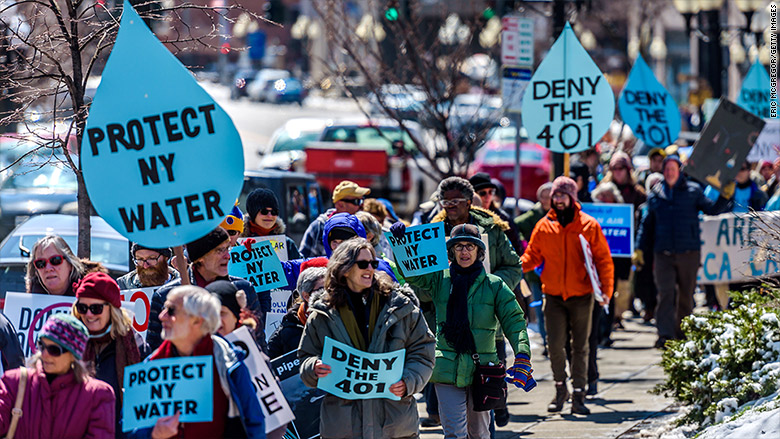
Score one for the fracktivists.
New York State has rejected a planned 125-mile long natural gas pipeline that was strongly opposed by environmentalists. Governor Andrew Cuomo's administration ruled late Friday the Constitution Pipeline project failed to meet the state's water quality standards.
The decision is a major blow to the pipeline, which was dreamt up four years ago as a way to transport natural gas fracked in Northeast Pennsylvania to Boston, New York City and other markets in the region.
This is at least the third fracking-related pipeline that has been rejected in the past year and underscores the growing political power of the anti-fracking movement, thanks in part to strong support from Bernie Sanders. The Democratic presidential candidate is pushing for a national ban on fracking and vocally opposed Constitution Pipeline due to environmental concerns.
On Sunday, Sanders applauded Cuomo's decision on Twitter, calling it a "win for NY, our planet, and our grandchildren." He said "safe fracking is like clean coal: fiction."
The Sierra Club put out a statement saying the Constitution Pipeline decision "represents a turning of the tide" that could "inspire a domino effect" on other states feeling emboldened to nix similar projects.
The Constitution Pipeline rejection is the latest setback for efforts to build pipelines that can transport North America's surging shale oil and natural gas. Late last year President Obama blocked the controversial Keystone XL Pipeline. An existing section of the Keystone pipeline suffered a leak earlier this month. Just last month, federal regulators rejected a multibillion-dollar natural gas pipeline and terminal project in Oregon known as Jordan Cove.
"It should be clear to all that the 'fractivists' in the Democratic Party are no longer fringe -- these people are now pretty close to the center" of the party, wrote Chris Krueger, senior policy analyst at Guggenheim Securities, in a recent report.
Related: Bernie Sanders wants to kill the fracking boom
On Monday the backers of the Constitution Pipeline, which include Williams Companies and Cabot Oil & Gas, blasted the New York decision as a purely political one and threatened legal action to overturn the ruling.
The New York State Department of Environmental Conservation's denial has "flagrant misstatements and inaccurate allegations and appears to be driven more by New York State politics than by environmental science," the project sponsors said in a joint statement.
Shares of Williams Companies (WMB), slumped 2% on Monday, while Cabot (COG) dropped 4%.
The pipeline companies said they worked closely with the state for the past three years to ease water quality concerns and even agreed to reroute the pipeline and devote more than $26 million towards trout stream restoration, wetland migration and for the preservation of migratory bird habitats.
The companies said they made weekly checks with conservation department to make sure no additional info was needed. The agency either didn't respond or said no more info was needed, the companies said.
The NY regulator "deliberately chose to remain silent to bolster the political campaign of the State," the companies said.
The conservation agency did not respond to a request for comment from CNNMoney.
Related: Fracking fallout: 7.9 million at risk of man-made earthquakes
Despite the setback, the Constitution Pipeline's backers said they remain "absolutely committed" to building this project. They argue the permit denial will delay about 2,400 direct and indirect jobs that would have been created during the pipeline's construction.
The American Petroleum Institute, which represents large oil and gas producers, said the Constitution Pipeline would have created jobs and lowered energy costs.
Sheila Hollis, a former energy regulator who is now a partner at the law firm Duane Morris, said it's very difficult to build any major new energy infrastructure project -- regardless of who is supporting it or the source of the power.
"Everything is mired in controversy," she said.
Hollis thinks this issue is on a "collision course" in certain parts of the country due to the push away from other forms of energy.
"If you close the coal plants and the nuclear plants, where is the generation going to come from?" she said.


